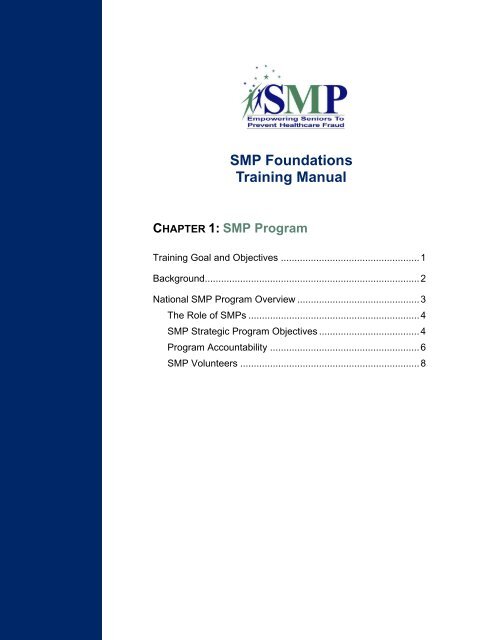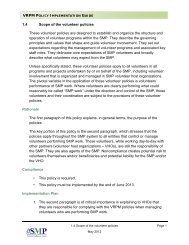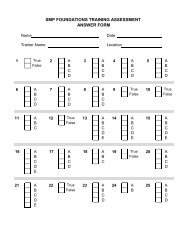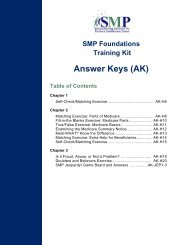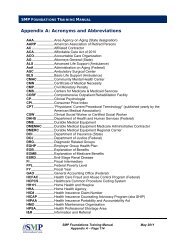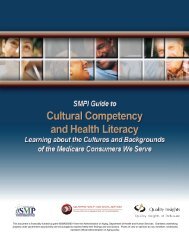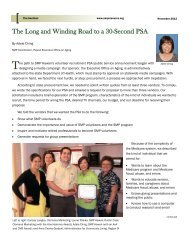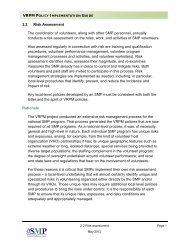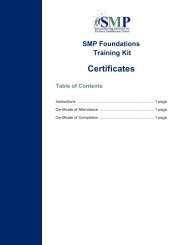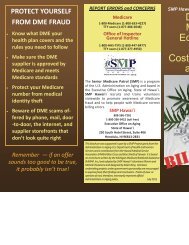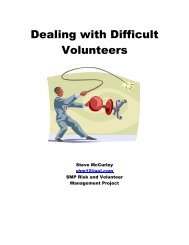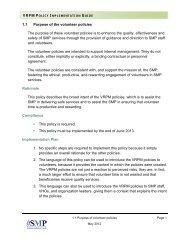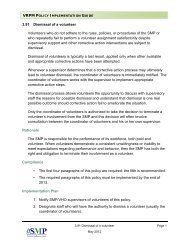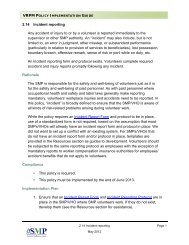SMP Foundations Training Manual CHAPTER 1 ... - SMPresource.org
SMP Foundations Training Manual CHAPTER 1 ... - SMPresource.org
SMP Foundations Training Manual CHAPTER 1 ... - SMPresource.org
You also want an ePaper? Increase the reach of your titles
YUMPU automatically turns print PDFs into web optimized ePapers that Google loves.
<strong>SMP</strong> <strong>Foundations</strong><br />
<strong>Training</strong> <strong>Manual</strong><br />
<strong>CHAPTER</strong> 1: <strong>SMP</strong> Program<br />
<strong>Training</strong> Goal and Objectives ................................................... 1<br />
Background ............................................................................... 2<br />
National <strong>SMP</strong> Program Overview ............................................. 3<br />
The Role of <strong>SMP</strong>s ............................................................... 4<br />
<strong>SMP</strong> Strategic Program Objectives ..................................... 4<br />
Program Accountability ....................................................... 6<br />
<strong>SMP</strong> Volunteers .................................................................. 8
<strong>SMP</strong> FOUNDATIONS TRAINING MANUAL<br />
<strong>CHAPTER</strong> 1: <strong>SMP</strong> Program<br />
This chapter provides an overview of the Senior Medicare Patrol (<strong>SMP</strong>) program.<br />
<strong>Training</strong> Goal and Objectives<br />
Goal: <strong>SMP</strong> <strong>Foundations</strong> <strong>Training</strong><br />
The goal of <strong>SMP</strong> <strong>Foundations</strong> <strong>Training</strong> is to provide volunteers with a foundation of<br />
knowledge in three main content areas:<br />
1. <strong>SMP</strong> Program<br />
2. Medicare Basics<br />
3. Medicare Fraud and Abuse<br />
Objectives: Chapter 1<br />
Upon completion of Chapter 1: <strong>SMP</strong> Program, you will be able to:<br />
1. Describe the background of the national <strong>SMP</strong> program<br />
2. Identify the three roles of <strong>SMP</strong>s<br />
3. List and explain the U.S. Administration on Aging’s <strong>SMP</strong> Strategic Program<br />
Objectives<br />
4. Describe the basic components of <strong>SMP</strong> program accountability and reporting<br />
5. Name the database used to track <strong>SMP</strong> activity and list ways that volunteers might<br />
interact with this database<br />
KEY<br />
TERMS<br />
<strong>SMP</strong>: This is the acronym for Senior Medicare Patrol.<br />
<strong>SMP</strong> <strong>Foundations</strong> <strong>Training</strong> <strong>Manual</strong> May 2011<br />
Chapter 1 – Page 1
<strong>SMP</strong> FOUNDATIONS TRAINING MANUAL<br />
Background<br />
The Department of Health and Human Services’ (HHS) Office of Inspector General<br />
(OIG) estimates that the Medicare program loses billions of dollars each year due to<br />
errors, fraud, and abuse.<br />
This problem affects all Americans. It affects beneficiaries by wasting Medicare<br />
money that could be used to increase and improve health care services. And, it<br />
affects everyone who pays taxes by wasting billions of tax dollars.<br />
While the vast majority of health care providers are honest, those operating<br />
unscrupulously—intent on obtaining precious health care dollars illegally—have done<br />
so based on the notion that the risks of being detected have lessened over the years.<br />
In 1997, through the Omnibus Consolidated Appropriation Act of 1997 (Public Law<br />
104-208), the U.S. Administration on Aging (AoA) established 12 grant-funded<br />
demonstration projects. These projects were designed to recruit and train retired<br />
professionals, such as doctors, nurses, teachers, lawyers, accountants, and others to<br />
identify and report error, fraud, and abuse.<br />
The Senate report (Senate Report 104-368) on the appropriations bill noted that<br />
“senior citizens are also our best front line defense against these losses. Yet often<br />
they don't have the information and expertise needed…” to recognize and accurately<br />
report cases of error, fraud, and abuse.<br />
Medicare is more than a health care program.<br />
It’s a promise from one generation of Americans to another.<br />
Keeping the promise is everyone’s responsibility.<br />
KEY<br />
TERMS<br />
Office of Inspector General (OIG): The HHS (Department of<br />
Health and Human Services) agency that is responsible for the<br />
investigation of suspected fraud and abuse and performing audits and<br />
inspections of HHS programs. The OIG has authority to levy certain<br />
sanctions and Civil Monetary Penalties.<br />
U.S. Administration on Aging (AoA): The HHS agency that is a<br />
focal point and advocacy agency for older persons and their concerns<br />
at the Federal level. AoA works closely with its nationwide network of<br />
State and Area Agencies on Aging (AAA) to plan, coordinate, and<br />
develop community-level systems of services that meet the unique<br />
needs of individual older persons and their caregivers.<br />
<strong>SMP</strong> <strong>Foundations</strong> <strong>Training</strong> <strong>Manual</strong> May 2011<br />
Chapter 1 – Page 2
<strong>SMP</strong> FOUNDATIONS TRAINING MANUAL<br />
National <strong>SMP</strong> Program Overview<br />
Since its inception in 1997, the <strong>SMP</strong><br />
program has evolved from a handful of<br />
diverse demonstration projects to a<br />
nationwide program. The <strong>SMP</strong><br />
program includes projects in all 50<br />
states, the District of Columbia, Puerto<br />
Rico, Guam, and the U.S. Virgin<br />
Islands.<br />
Every three years AoA develops a<br />
new request for proposals for the <strong>SMP</strong><br />
program and then competitively<br />
awards grants to projects that are<br />
selected. Funding for the program is<br />
provided by a grant from AoA. In addition, each project is required to provide<br />
“matching” contributions of a certain amount. Even though the program has been<br />
around for more than a decade, it is still not considered a permanent program.<br />
The goal of the <strong>SMP</strong> program is to empower seniors to<br />
prevent health care fraud through outreach and education.<br />
<strong>SMP</strong>s have made great progress in recruiting and training retired professionals and<br />
other senior citizens about Medicare and Medicaid error, fraud, and abuse.<br />
These volunteers work in their communities, senior centers, and elsewhere to<br />
educate Medicare and Medicaid beneficiaries, family members, and caregivers to<br />
actively protect themselves against health care fraud, waste, and abuse by reviewing<br />
their Medicare Summary Notices (MSNs) to detect and report suspected errors.<br />
KEY<br />
TERMS<br />
Medicaid: A joint Federal and State program that helps with medical<br />
costs of people with low incomes and limited resources. Medicaid<br />
programs vary from state to state, but most health care costs are<br />
covered if you qualify for both Medicare and Medicaid.<br />
Medicare: The Federal insurance program for people 65 years of age<br />
and older and certain younger people with disabilities, and people with<br />
End-Stage Renal Disease (permanent kidney failure with dialysis or a<br />
transplant, abbreviated ESRD) or Amyotrophic Lateral Sclerosis (ALS).<br />
Medicare Summary Notices (MSNs): The notices you get after the<br />
doctor or provider files a claim for Part A or Part B services in original<br />
Medicare. It explains what the provider billed for, the Medicare-approved<br />
amount, how much Medicare paid, and what you may be billed.<br />
<strong>SMP</strong> <strong>Foundations</strong> <strong>Training</strong> <strong>Manual</strong> May 2011<br />
Chapter 1 – Page 3
<strong>SMP</strong> FOUNDATIONS TRAINING MANUAL<br />
National <strong>SMP</strong> Program Overview, continued<br />
The Role of <strong>SMP</strong>s<br />
The role of the Senior Medicare Patrol program is to:<br />
1. Disseminate <strong>SMP</strong> fraud prevention and identification information through the<br />
media, outreach campaigns, community events, and many other means.<br />
2. Assist beneficiaries in resolving potential fraud-related inquiries and issues<br />
regarding Medicare, Medicaid, and other health care or related consumer issues.<br />
3. Make referrals of suspected cases of<br />
fraud, waste, or abuse to appropriate<br />
investigative entities, such as:<br />
Medicare contractors<br />
<br />
<br />
<br />
<br />
State Medicaid Fraud Control<br />
Units (MFCU)<br />
State Attorneys General (AG)<br />
Department of Health and<br />
Human Services’ Office of<br />
Inspector General (OIG)<br />
Centers for Medicare & Medicaid<br />
Services (CMS)<br />
<strong>SMP</strong> Strategic Program Objectives<br />
The <strong>SMP</strong> Message:<br />
Protect, Detect, Report<br />
<strong>SMP</strong>s provide seniors with<br />
information to:<br />
PROTECT themselves from<br />
Medicare errors, fraud and abuse;<br />
DETECT potential errors, fraud<br />
and abuse; and<br />
REPORT their concerns.<br />
This message of “protect, detect,<br />
report” is a core part of the <strong>SMP</strong><br />
program and is reviewed in greater<br />
detail in chapter 3.<br />
AoA regularly works in conjunction with state <strong>SMP</strong> programs to develop and refine<br />
national program objectives. These objectives provide guidance and direction to the<br />
local <strong>SMP</strong> programs. As part of the grant-seeking process, potential <strong>SMP</strong>s must<br />
develop a set of activities that are designed to meet the needs of local communities<br />
while contributing to a set of national program objectives.<br />
The current <strong>SMP</strong> Strategic Program Objectives are to:<br />
<br />
<br />
Foster National and Statewide Program Coverage: Statewide program<br />
coverage is defined as service to each county within the state, each ward in the<br />
District of Columbia, or jurisdiction in the territories.<br />
Improve beneficiary education and inquiry resolution: Each <strong>SMP</strong> is required<br />
to implement a plan for increasing the number of beneficiaries educated about<br />
health care fraud through expansion of their volunteer capacity. This objective<br />
includes specific requirements for recruiting, screening and training senior<br />
volunteers.<br />
<strong>SMP</strong> <strong>Foundations</strong> <strong>Training</strong> <strong>Manual</strong> May 2011<br />
Chapter 1 – Page 4
<strong>SMP</strong> FOUNDATIONS TRAINING MANUAL<br />
National <strong>SMP</strong> Program Overview, <strong>SMP</strong> Strategic Program Objectives, continued<br />
<br />
<br />
Foster national program visibility and consistency: <strong>SMP</strong>s are required to<br />
assess the risk in their volunteer programs as well as implement programs for<br />
adequately screening new volunteers. In addition, every program must utilize<br />
SMART FACTS, the <strong>SMP</strong> data management system, to accurately record and<br />
report performance measures in a timely manner.<br />
Improve the efficiency of the <strong>SMP</strong> program while increasing results for both<br />
operational and quality measures: At a minimum, <strong>SMP</strong> programs are required<br />
to track and increase the following:<br />
1. Volunteer involvement, including the number of volunteers and the hours<br />
contributed by volunteers<br />
2. The number of beneficiaries educated by group and one-on-one sessions<br />
3. The number of simple inquiries and complex issues addressed<br />
4. Medicare, Medicaid, or other savings achieved or referred for further action as<br />
a result of program efforts<br />
Target training and education to isolated and hard-to-reach populations:<br />
The Older Americans Act (OAA) requires that program services target lowincome,<br />
vulnerable populations that are traditionally underserved due to isolation;<br />
ethnic, cultural, language barriers; or other factors. <strong>SMP</strong>s must identify specific<br />
target populations within their state, and provide a plan to reach these special<br />
populations. The OAA is the federal law that created services, opportunities, and<br />
protections for older Americans.<br />
<strong>SMP</strong> Resource Center<br />
One of the resources available to <strong>SMP</strong> programs is the<br />
National Consumer Protection Technical Resource Center,<br />
also known as the <strong>SMP</strong> Resource Center, or simply The Center.<br />
Funded by AoA, The Center provides training and technical support<br />
including mentoring of new projects, disseminating best practices<br />
and innovations, technical assistance, training, and support of<br />
<strong>SMP</strong> project implementation and effective use of AoA’s data management<br />
tracking and reporting system (called SMART FACTS).<br />
The Center website for <strong>SMP</strong> Resources is www.smpresource.<strong>org</strong>.<br />
<strong>SMP</strong> <strong>Foundations</strong> <strong>Training</strong> <strong>Manual</strong> May 2011<br />
Chapter 1 – Page 5
<strong>SMP</strong> FOUNDATIONS TRAINING MANUAL<br />
National <strong>SMP</strong> Program Overview, continued<br />
Program Accountability<br />
As a government-funded initiative, the<br />
<strong>SMP</strong> program is accountable for<br />
documenting and reporting on<br />
program activities and outcomes to a<br />
number of entities.<br />
Semiannually, the OIG collects and<br />
analyzes data submitted by <strong>SMP</strong><br />
programs on the activities and<br />
performance results of the program.<br />
<strong>SMP</strong>s use an online database known<br />
as SMART FACTS for capturing and reporting data to the OIG.<br />
SMART FACTS allows <strong>SMP</strong>s to track and report on the following activities:<br />
1. Information related to the receipt, resolution, and/or referral of complex issues and<br />
complaints of health care fraud, errors, or abuse<br />
2. Outreach and education activities<br />
3. Volunteer time and effort<br />
KEY<br />
TERMS<br />
SMART FACTS: The Seniors Medicare Assistance and Reporting Tool for<br />
Fraud And Complaint Tracking System. SMART FACTS is the web-based<br />
electronic tool for <strong>SMP</strong> management, tracking, and reporting of program<br />
outcomes to AoA and to the Office of the Inspector General (OIG).<br />
Complex Issue: The OIG performance measure definition of a complex issue<br />
is: “Inquiries that generally require the <strong>SMP</strong> staff or volunteer to obtain<br />
beneficiary personal identifying information and detailed information related to<br />
the issue, complaint, or allegation in order to conduct further investigation or<br />
referral.” Complaints, defined by the OIG as allegations of errors, fraud, and<br />
abuse, are one type of complex issue.<br />
<strong>SMP</strong> <strong>Foundations</strong> <strong>Training</strong> <strong>Manual</strong> May 2011<br />
Chapter 1 – Page 6
<strong>SMP</strong> FOUNDATIONS TRAINING MANUAL<br />
National <strong>SMP</strong> Program Overview, Program Accountability, continued<br />
Some volunteers interact directly with SMART FACTS, while others use reporting<br />
forms to submit their data for someone else to enter in SMART FACTS.<br />
As a volunteer, you may interact with SMART FACTS in one or more of the following<br />
ways:<br />
1. Completing and submitting timesheets and activity reports, which are then entered<br />
into SMART FACTS and reported as part of the OIG Performance Measures<br />
2. Utilizing a reporting form to submit information about simple inquiries<br />
3. Submitting information about community Outreach & Education activities that is<br />
then reported as part of the OIG Performance Measures<br />
4. Entering data on activities and reporting forms into SMART FACTS<br />
5. Accessing the SMART FACTS’ Complex Issues module to refer an allegation of<br />
fraud and abuse to an investigative entity<br />
There is an extensive SMART FACTS training manual and set of resources which are<br />
available in the event you require more information and training on SMART FACTS.<br />
Your <strong>SMP</strong> program director will provide information on specific SMART FACTS<br />
reporting and training requirements.<br />
What’s with all the paperwork<br />
You might wonder why there is so much emphasis on timesheets,<br />
activities, and reports being turned in to your program. To continue<br />
receiving funding, <strong>SMP</strong>s are required to report detailed information on<br />
their activities to the OIG and AoA. From there, reports about<br />
volunteer activities go on to Congress, where the buck literally stops.<br />
Since 1997, the <strong>SMP</strong> program has reported performance data to AoA and the OIG.<br />
This data provides useful tracking information on <strong>SMP</strong> progress; however, as the<br />
<strong>SMP</strong>s and the OIG readily acknowledge, it doesn’t always paint a complete picture of<br />
the work done by the <strong>SMP</strong>s.<br />
<strong>SMP</strong> <strong>Foundations</strong> <strong>Training</strong> <strong>Manual</strong> May 2011<br />
Chapter 1 – Page 7
<strong>SMP</strong> FOUNDATIONS TRAINING MANUAL<br />
National <strong>SMP</strong> Program Overview, Program Accountability, continued<br />
Although beneficiaries may learn about how to detect fraud, waste, and abuse from<br />
an <strong>SMP</strong> project’s outreach and education activities, they don’t necessarily follow up<br />
directly with the <strong>SMP</strong> regarding their results. It’s important to understand that there<br />
are many successes of the <strong>SMP</strong>s that are not included in their performance data.<br />
For example:<br />
Beneficiaries might call the OIG fraud hotline or other contacts to report an<br />
incident of suspected fraud.<br />
<br />
Beneficiaries may achieve substantial cost savings by reviewing their MSN and<br />
medical bills using the information learned from the <strong>SMP</strong>s, and follow up on their<br />
own to resolve errors or abuse.<br />
Even though <strong>SMP</strong> reporting results are not all-inclusive, the data about program<br />
activities and outcomes that the <strong>SMP</strong>s are able to capture is very important. This<br />
data allows the <strong>SMP</strong>s to “tell the story” of what they have accomplished, the people<br />
they have helped, and the money that has been recouped for beneficiaries and the<br />
Medicare and Medicaid programs.<br />
<strong>SMP</strong> Volunteers<br />
The number of retired people is growing fast. Most take comfort in knowing that the<br />
Medicare program will be there to provide health care coverage as they age.<br />
Due to the unscrupulous practices of a small number of people, Medicare and<br />
Medicaid are being drained of billions of dollars of valuable resources that<br />
beneficiaries rely on when it comes to their health and the health of their loved ones.<br />
The <strong>SMP</strong> program provides an opportunity for seniors to step up and make an impact<br />
in the fight against fraud. The dedicated corps of <strong>SMP</strong> volunteers makes a difference.<br />
<strong>SMP</strong> programs seek volunteers whose skills, abilities, and personal goals are<br />
compatible with the goals and mission of the program.<br />
"I wouldn't be alive if it wasn't for Medicare. I owe Medicare something<br />
in order to keep it going so someone else can use it like I had to….<br />
I want other people to have the option of living 24 more years if they want."<br />
Mrs. Dottie Lund,<br />
a speaker to senior groups in Wisconsin who has assisted with outreach since 2001<br />
<strong>SMP</strong> <strong>Foundations</strong> <strong>Training</strong> <strong>Manual</strong> May 2011<br />
Chapter 1 – Page 8
<strong>SMP</strong> FOUNDATIONS TRAINING MANUAL<br />
National <strong>SMP</strong> Program Overview, <strong>SMP</strong> Volunteers, continued<br />
One of the main goals of the <strong>SMP</strong> program is to develop a corps of senior volunteers<br />
and professionals that can help their peers become better health care consumers.<br />
Most <strong>SMP</strong> programs also provide opportunities for civic-minded individuals not yet<br />
eligible for Medicare who have the time and interest.<br />
Volunteers are a valuable resource to the <strong>SMP</strong> program, the agency you work with,<br />
its staff, and its clients.<br />
According to data captured in SMART FACTS, in 2010 alone:<br />
4,964 volunteers served <strong>SMP</strong> programs.<br />
Volunteers received 53,878 hours of training and contributed 129,662 work hours<br />
in support of the <strong>SMP</strong> program.<br />
With the help of volunteers, <strong>SMP</strong>s across the country:<br />
• Educated 298,097 beneficiaries in 8,300 group education sessions<br />
• Held 70,789 one-on-one counseling sessions<br />
• Conducted 51,885 media airings<br />
• Reached 1,469,785 people in 6,231 community outreach education events<br />
• Received 91,094 simple inquiries<br />
• Received 2,273 complex issues<br />
40% of these, with an estimated dollar value of over $1.48 million,<br />
were referred to other entities for further action.<br />
73% of complex issues were resolved.<br />
Since the program’s inception through 2010,<br />
<strong>SMP</strong> project efforts have resulted in:<br />
82,968 group education sessions<br />
Over 1.1 million one-on-one counseling sessions convened<br />
1,321,222 media airings<br />
Over 25.3 million people reached during community education events<br />
261,878 simple inquiries received<br />
27,008 complex issues received<br />
Almost $106 million in documented savings directly attributable to <strong>SMP</strong> projects<br />
<strong>SMP</strong> <strong>Foundations</strong> <strong>Training</strong> <strong>Manual</strong> May 2011<br />
Chapter 1 – Page 9


